 "Josh Welton" (watchtheprettylight)
"Josh Welton" (watchtheprettylight)
08/05/2013 at 08:44 • Filed to: Aresenal of Democracy, World War 2, welding, philosophy, brown dog welding, Chrysler, Detroit, bookopnik
 7
7
 57
57
 "Josh Welton" (watchtheprettylight)
"Josh Welton" (watchtheprettylight)
08/05/2013 at 08:44 • Filed to: Aresenal of Democracy, World War 2, welding, philosophy, brown dog welding, Chrysler, Detroit, bookopnik |  7 7
|  57 57 |
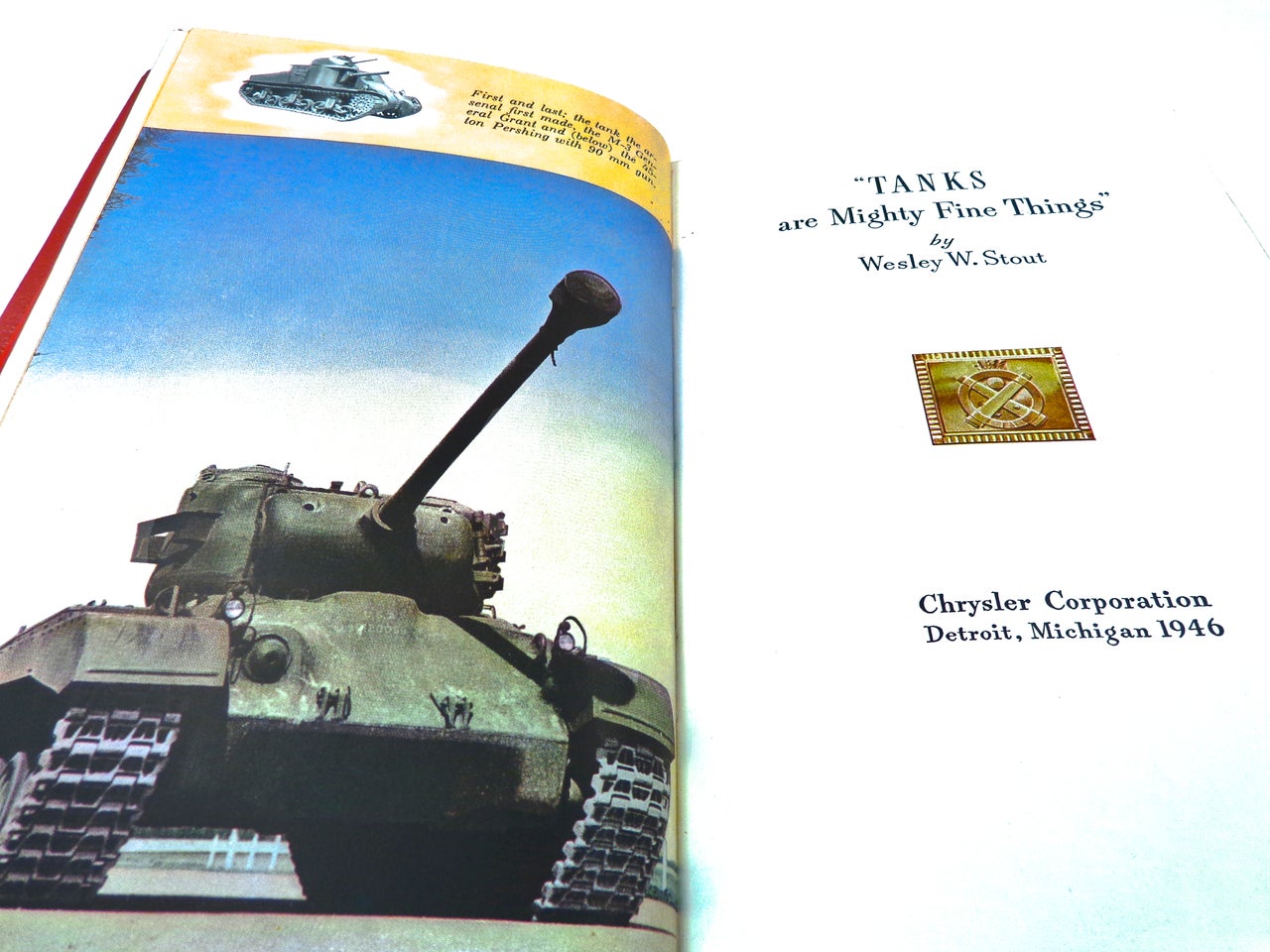
I had been looking for this set of books for a while, found it earlier this year. As a millwright who went through the apprenticeship at Chrysler, as a driver/mechanic for General Dynamics(formerly Chrysler Defense) that gets to take an Abrams around the test track every now and then, as a fabricator who builds prototype military parts, and as an artist who enjoys repurposing metal….it’s cool to see how my worlds collided so many decades ago to win WWII.
In the mid-late '40s Chrysler commissioned Wesley Stout to put out a series of books chronicling the ingenuity, engineering, and brute strength it put forth to bolster the Arsenal of Democracy. This is it, a first print, the entire set.
When I contemplate the monumental undertaking that United States manufacturing embarked on 70 years ago, it’s hard to fathom. I wonder if the people who were so adamant that the government should deny Chrysler assistance through the last financial crisis would feel the same way if they truly understood that without the wartime production of Detroit manufacturers, without the resources Detroit poured into the war effort that went FAR above and beyond what was asked of them(and the speed at which they did it), the outcome of World War 2 could have been much different.
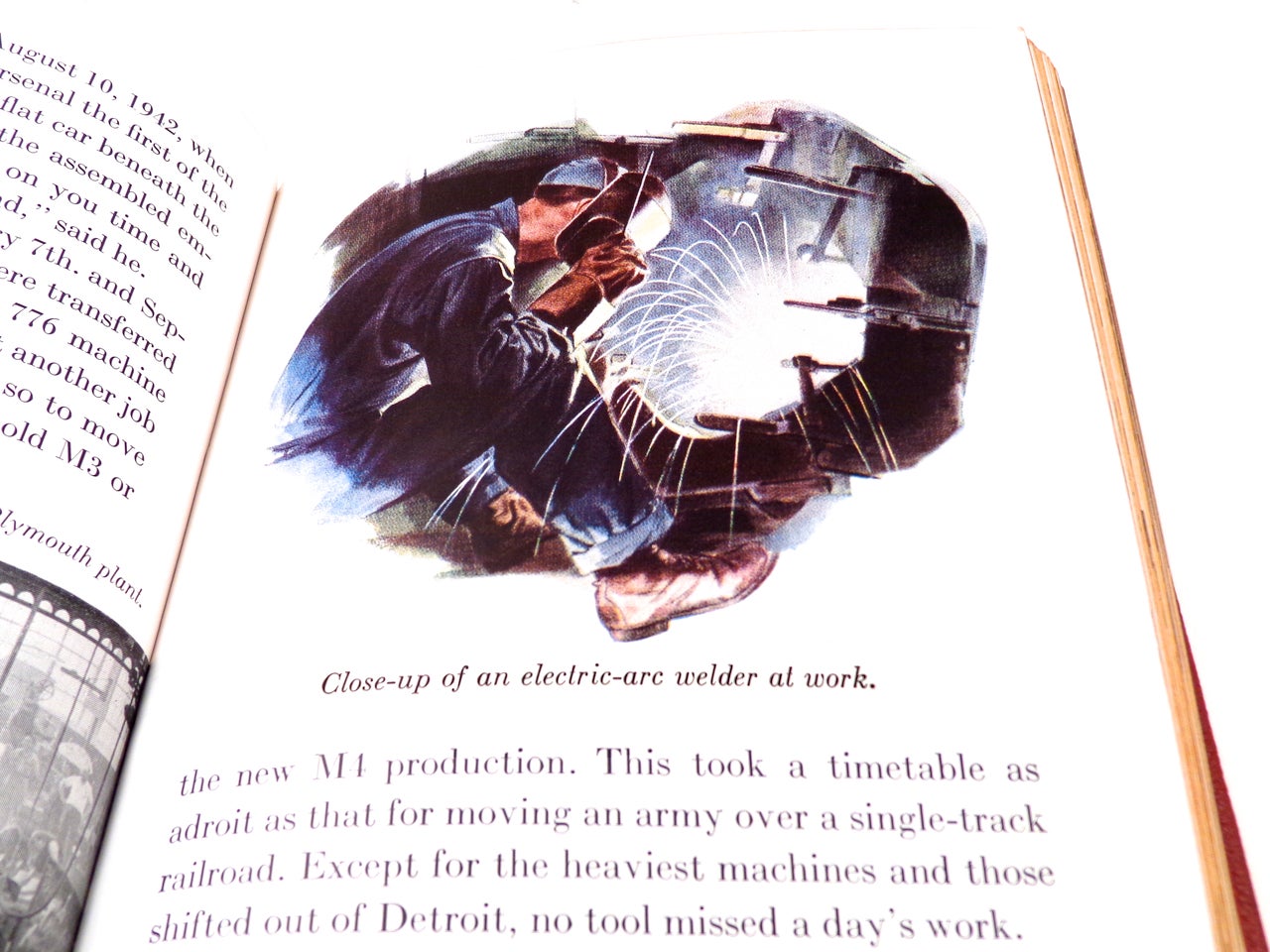
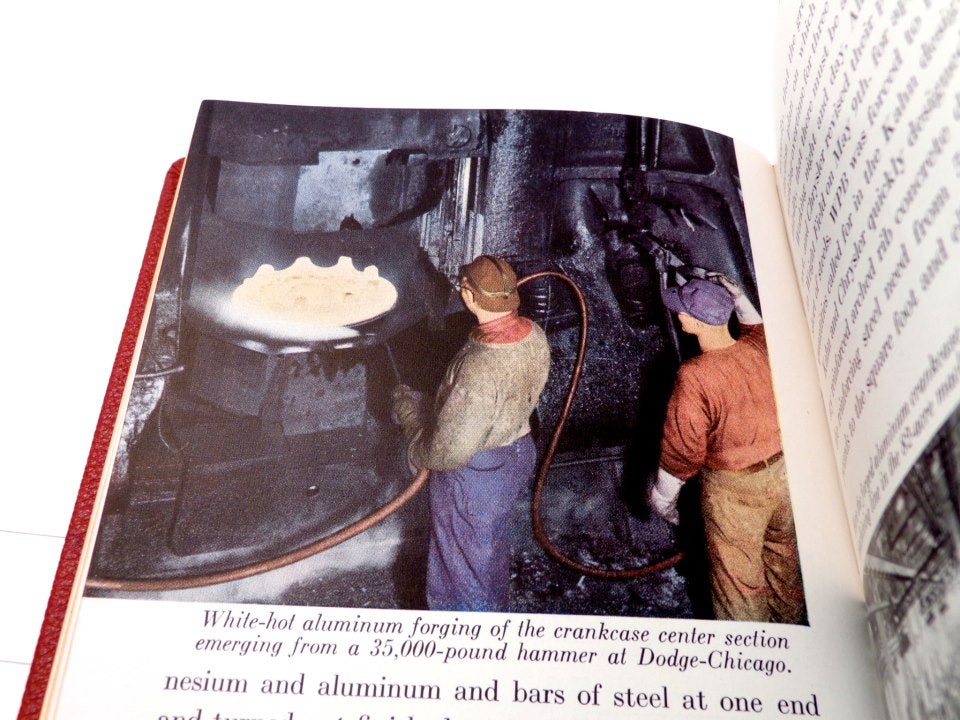
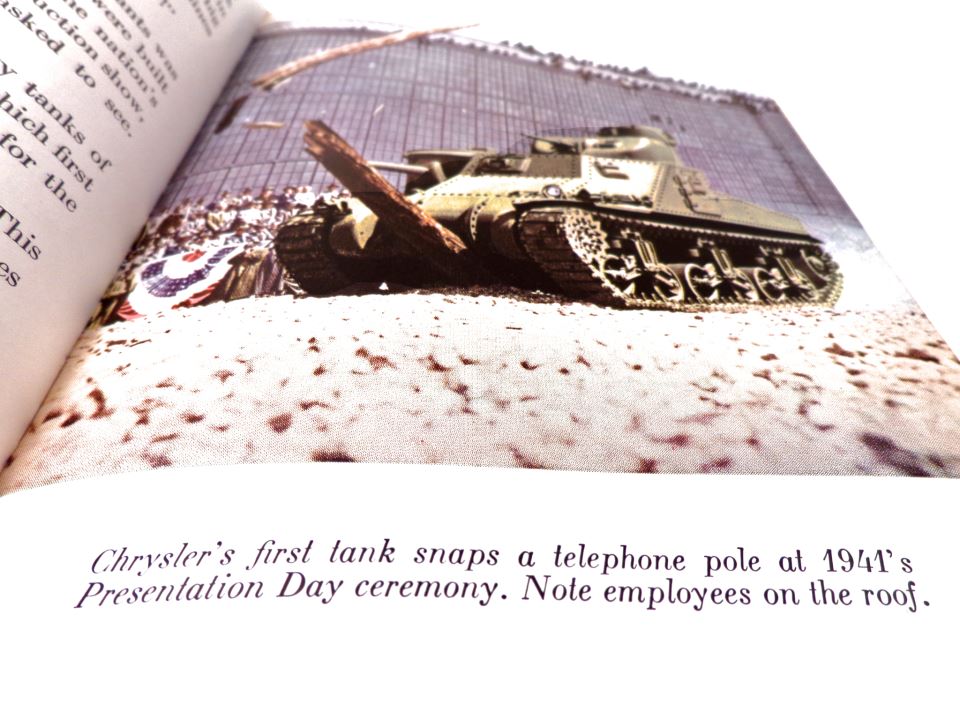

 RamblinRover Luxury-Yacht
> Josh Welton
RamblinRover Luxury-Yacht
> Josh Welton
08/05/2013 at 08:46 |
|
"Tanks are mighty fine things"
Damn straight.
 ttyymmnn
> Josh Welton
ttyymmnn
> Josh Welton
08/05/2013 at 08:56 |
|
I wonder if the people who were so adamant that the government should deny Chrysler assistance through the last financial crisis would feel the same way if they truly understood that without the wartime production of Detroit manufacturers....
Politicians are the embodiment of, "What have you done for me lately?"
What a fabulous set of books. I had never seen them before, and would love a chance to see them. Not to take anything away from the industrial achievements, America did have the distinct advantage of not having their industries bombed into oblivion during the war.
 Mosqvich
> Josh Welton
Mosqvich
> Josh Welton
08/05/2013 at 09:17 |
|
Is the plant still on VanDyke? I used to drive by it a lot and look at the test track. It was always cool to see. The books look magnificent.
 kcoxphotography
> Mosqvich
kcoxphotography
> Mosqvich
08/05/2013 at 11:26 |
|
Yes, it is still there. (Not functioning any longer but still present)
 Mosqvich
> kcoxphotography
Mosqvich
> kcoxphotography
08/05/2013 at 12:03 |
|
Where do they build and test them now?
 Josh Welton
> Mosqvich
Josh Welton
> Mosqvich
08/05/2013 at 13:03 |
|
They build Abrams in Lima, Ohio.
They have a testing facility there. Just up the road from the old tank plant is the GDLS prototype shop, we have a small track there too.
The old plant is partially there. Some areas have been converted for civilian use, and TACOM owns part of it, I believe.
 Kugelblitz
> Josh Welton
Kugelblitz
> Josh Welton
08/06/2013 at 15:53 |
|
Heck just one U.S. truck factory outproduced the entire German industry. At one point, U.S. intelligence released through a double agent the actual monthly production of twin-engined aircraft to the Abwehr. The figures were considered impossible and not credible.
 Kugelblitz
> Josh Welton
Kugelblitz
> Josh Welton
08/06/2013 at 15:55 |
|
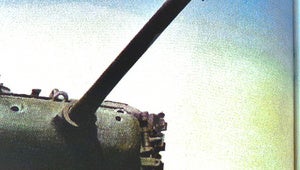
90mm HVAP! Fear this gun, panzer crews!
 Josh Welton
> Kugelblitz
Josh Welton
> Kugelblitz
08/06/2013 at 16:00 |
|
It truly was incredible the quickness that we reacted with, and then with the amount we were able to produce. The kinds of things that wouldn't have happened if either the government or the manufacturers would have followed procedure. They cut through the red tape and won the war.
 jcpwn3r
> Josh Welton
jcpwn3r
> Josh Welton
08/09/2013 at 09:51 |
|
I wonder how the banks helped us win world war 2... oh that's right, they threw us into the Great Depression which helped cause world war 2. Yeah the big 3 can go fuck themselves the greedy bastards
 Turbineguy: Nom de Zoom
> Josh Welton
Turbineguy: Nom de Zoom
> Josh Welton
08/09/2013 at 09:54 |
|
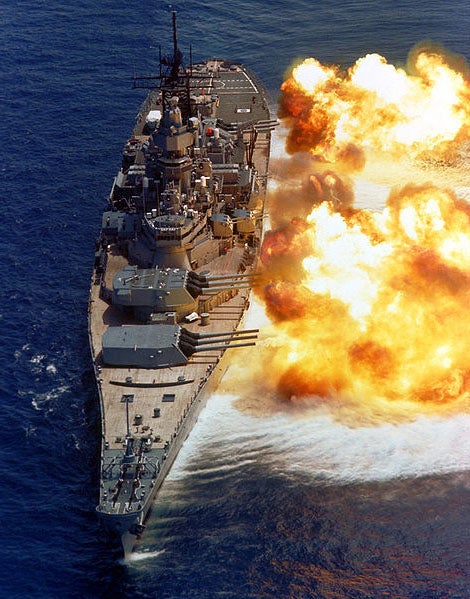
Battleships are mighty fine things too. (my fav photo of the Iowa)
 Old-Busted-Hotness
> jcpwn3r
Old-Busted-Hotness
> jcpwn3r
08/09/2013 at 09:59 |
|
If banks then were like banks now, they probably pissed off all their customers, putting them in the mood to shoot somebody.
That's the best I can do.
 pauljones
> Josh Welton
pauljones
> Josh Welton
08/09/2013 at 09:59 |
|
Detroit's manufacturing surge in WWII well and truly is one of the most spectacular industrial feats in history, perhaps matched only by the incredible production of ships during the war and, later, by the Apollo program. I suppose, a bit more ominously, the last decade's worth of data intelligence and snooping is equally (but frighteningly) impressive in terms of scale.
The most interesting thing about all of those efforts, however, is the one thing that the have in common. As you point out, when the red tape gets cut, shit just gets done. It always seems that no matter what the application is, nothing ever truly happens until we scare ourselves right out of the comfort zone of our rules and regulations. The only problem is that that is an incredibly sharp double-edged sword, as we're experiencing right now.
 David E. Davis
> Josh Welton
David E. Davis
> Josh Welton
08/09/2013 at 10:08 |
|
May I ask where you were able to find the complete set? Ebay?
 nycsingletrack
> Kugelblitz
nycsingletrack
> Kugelblitz
08/09/2013 at 10:29 |
|
Not really.
Panzer 3's, Tigers etc. were far better tanks.
We had more ammo, more fuel, and we built them faster than Germany could blow them up. Ie better factories (also better refineries, better shipyards etc).
 Bruno Martini
> nycsingletrack
Bruno Martini
> nycsingletrack
08/09/2013 at 10:40 |
|
That's a Pershing, it was far more agile and much faster than a tiger or panzer of the time. It had less armor but when the crew knew what they were doing they could wipe out a whole battalion of panzers and tigers with little to no casualties. Think of it as a sportscar of tanks. Also had a fairly fast turret, using high intensity rounds the 90mm could pen a tiger head on and keep going. Agility vs brute strength. Patton recognized this when he commanded the us armed forces through Africa. Unfortunately the US armed forces were poorly trained to utilize the strength of their machines. Even the m1 abrams is not the most heavily armored vehicle in the world, however it is fast as hell and has a firing rate that is nearly unbeatable not to mention rounds that penetrate over a foot of steel making it look like swiss cheese. Utilized at its fullest there no other tank commanders that would not piss their pants at the site of it.
 Equana
> Josh Welton
Equana
> Josh Welton
08/09/2013 at 10:43 |
|
Sad to think that Chrysler was once owned by a Axis power (Germany) and is now owned by another (Italy). Can't dwell on the past though, that will always be throwing good money after bad. Save it because it has a chance of succeeding, not because we fell pride at previous accomplishments, IMHO
 medic.abe
> Kugelblitz
medic.abe
> Kugelblitz
08/09/2013 at 11:30 |
|
Another thing to consider, on the scope of things:
The german land area is roughly the size of the 4th largest state in the US - and the US had double the population. 69 million (approximately) versus 134 million (approximately). Of those, the Germans had 18 million people in the military. That would leave 51 million for the labor force.
America started 1940 with 56 million people working in industry. Of course we were able to outproduce them. We had more people working in one sector of our economy than they did working in all sectors of their economy. :)
 Weird Fishes
> Kugelblitz
Weird Fishes
> Kugelblitz
08/09/2013 at 11:35 |
|
It's probably why they surrendered.
 Weird Fishes
> David E. Davis
Weird Fishes
> David E. Davis
08/09/2013 at 11:37 |
|
I'd love to add this to my collection as well.
 Josh Welton
> David E. Davis
Josh Welton
> David E. Davis
08/09/2013 at 11:39 |
|
Amazon! I had been looking for YEARS though. You can find 3 or 4 together rather easily, but the entire set is a unicorn hunt. Turns out the guy was local even....which makes sense, really.
 Sean
> jcpwn3r
Sean
> jcpwn3r
08/09/2013 at 11:42 |
|
whaaaat??? The great depression had nothing to do with the start of WWII. The U.S. had nothing to do with the start of WWII. We were a neutral country, for the first two years.
 Josh Welton
> Equana
Josh Welton
> Equana
08/09/2013 at 11:42 |
|
I don't disagree with any of theses sentiments.
I just think, in this case, a history lesson helps grease the rails a bit.
The Merc takeover was a low point. If you ever get a chance, read " Taken for a Ride, " brilliant read.
!!! UNKNOWN CONTENT TYPE !!!
 Josh Welton
> pauljones
Josh Welton
> pauljones
08/09/2013 at 11:52 |
|
Yup!! It's a shame we can't find a balance...but it seems like we're stuck at one end or the other.
 0mgk14
> ttyymmnn
0mgk14
> ttyymmnn
08/09/2013 at 11:58 |
|
It is a double edged sword. Though we had no bombers to worry about. The travel across the atlantic was very slow and riddled with u-boats. Millions of tons of good were lost. We didnt have it as easy as you seem to think.
 kk
> Josh Welton
kk
> Josh Welton
08/09/2013 at 12:01 |
|
Which lesson is that? That an alcoholic is not an alcoholic because his grandfather ran marathons 50 years ago? Detroit and Chrysler now has nothing, but the names, common with Detroit and Chrysler then. Someone at Enron did something good for someone at some point. Want to bail that one out?
 Josh Welton
> kk
Josh Welton
> kk
08/09/2013 at 12:12 |
|
"running a marathon" or "doing a good deed" aren't exactly in the same scope as "Winning a World War"....
And I would argue that there still is a common thread. The auto industry is STILL the heart of American Manufacturing, and Detroit is STILL the heart of the American auto industry. The argument against saving Chrysler and GM was at times as much about how we don't need manufacturing as anything else. I do think depleting our manufacturing base and having a service based economy would have ill effects long term.
 Ntovorni
> Turbineguy: Nom de Zoom
Ntovorni
> Turbineguy: Nom de Zoom
08/09/2013 at 12:19 |
|
Any battleship at full broadside is a magical thing. Especially the shots of the Iowa.
 mynameISNOTkid
> ttyymmnn
mynameISNOTkid
> ttyymmnn
08/09/2013 at 12:31 |
|
I wasnt against the loans i just thought there should be a stipulation that they move their overseas factories back to Detroit if they wanted help.
 ukulalien
> Josh Welton
ukulalien
> Josh Welton
08/09/2013 at 12:45 |
|
When I first saw your name I read it as "Brown Do Gwelding" and I immediately thought, "what is Gwelding." I am dim. Magnificent post, by the way.
 Josh Welton
> ukulalien
Josh Welton
> ukulalien
08/09/2013 at 12:47 |
|
that makes two of us...ha!
I had a lady at a show say (squinting eyes, struggling to read) "Brown.....Dog....Wedding???" Uh....close enough.
 imperialist1960
> Josh Welton
imperialist1960
> Josh Welton
08/09/2013 at 12:52 |
|
These books are available online at the Online Imperial Club. The one on tanks is just OK. May I suggest ENGINEERING: MOBILIZED:
http://imperialclub.com/Yr/1945/49Mobi…
The rest of them are in the upper right hand corner box here:
http://imperialclub.com/Yr/1945/index.…
 Josh Welton
> imperialist1960
Josh Welton
> imperialist1960
08/09/2013 at 12:55 |
|
Very cool!!!
 kk
> Josh Welton
kk
> Josh Welton
08/09/2013 at 13:07 |
|
Did Chrysler Sebring or Jeep Compass win World War? No, they did not. Your article was not about Chrysler being the heart of American manufacturing. It was about looking at the present state of Chrysler and Detroit differently because their grandfathers did something extraordinary. The current Chrysler or Detroit should not be mentioned in the same sentence with World War because they have nothing to do with each other. The current Chrysler or Detroit has no pride or balls. Their current state is a consequence of making awful cars and awful financial decisions for a very long time. Five years after the bailout I see no Chrysler worth buying. Maybe it's Chrysler's turn to think about saving American manufacturing, not the taxpayers'?
 Josh Welton
> kk
Josh Welton
> kk
08/09/2013 at 13:16 |
|
If you've seen nothing good from Chrysler in the last 5 years, that's your opinion. My opinion would be slightly different, but to continue this argument would be to go down a rabbit hole that's inconsequential to my point.
Since you're attempting talking points that have been discussed elsewhere here already, I'm just gonna copy/paste:
I'm not gonna argue that poor decisions were made, but ultimately the auto industry is cyclical. Every automaker goes through periods where they need to borrow money to get through the down times. Ford did at this time too, they just leveraged their assets and secured the loans first. By the time Chrysler(and GM) attempted to get help, the housing market bubble had fully burst and the economy tanked and private lenders weren't in a position to do so.
WW2 isn't exactly ancient history. I'd argue that keeping a strong manufacturing base is important now as ever.
 kk
> Josh Welton
kk
> Josh Welton
08/09/2013 at 13:29 |
|
"Since you're attempting talking points" - is that a line of argument now? Good luck with your Chrysler tank.
 Josh Welton
> kk
Josh Welton
> kk
08/09/2013 at 13:40 |
|
It was a statement, not an argument. Something that was covered elsewhere.
 jcpwn3r
> Sean
jcpwn3r
> Sean
08/09/2013 at 13:45 |
|
ehhhh not quite. The US was a large creditor to Weimar Germany during the 20's and 30's. Germany owed obscene amounts of money to the UK and France as per the treaties following world war 1, so they borrowed money from the US to pay the UK and France, who then used that money to buy goods from the US... so there was this monetary circle between the US, Germany, and Western Europe. When our economy tanked, we cut the loans from Germany and told them they needed to pay back all those loans immediately. As a result, the German economy and political system fell back into chaos, allowing the Nazi party to gain power among the chaos, and eventually achieve full control.
While many contend that the harsh reparation treaties the Germans had to agree to after world war 1 set up germany to fail, allowing for the nazi party to rise, causing WW2. the US certainly wasn't clean and although we were militarily neutral, economically we were smack in the middle of the battle.
 Sean
> jcpwn3r
Sean
> jcpwn3r
08/09/2013 at 13:58 |
|
That's an interesting perspective that I haven't really heard before. I was a history major, and absolutely love WWII history. I'd say you have some points, but I don't think they are major events leading up to the war. Germany's economy was in the tank long before the bank crash in the U.S. The Nazi party had been gaining power in the government since 1925. The German Referendum in 1929 was what really catapulted the Nazi party into power. This happened in December, and of course the Stock Market Crash happened in October.
And of course the U.S. had it's hands dirty. The land-lease act was a prime example, but to say that our market crash was the catalyst for the war is a bit of a stretch.
 Detroit Velvet Smooth
> Bruno Martini
Detroit Velvet Smooth
> Bruno Martini
08/09/2013 at 14:19 |
|
Kurt Knispel and Michael Wittmann would like to have a word....
http://en.wikipedia.org/wiki/Michael_W…
 Detroit Velvet Smooth
> Kugelblitz
Detroit Velvet Smooth
> Kugelblitz
08/09/2013 at 14:29 |
|
Its kinda hard to build stuff when you are constantly being bombed. But production somehow increased as the war went on for the Nazis oddly enough.
 jcpwn3r
> Sean
jcpwn3r
> Sean
08/09/2013 at 14:36 |
|
I forget what the text book was called that I read that from, but it was pretty interesting. And I by no means am saying that the US economy crash was a cause for WW2, but it definitely had a role to play. I think world war 1 was the biggest cause for world war 2. I was merely trying take a jab at those who said nothing when we bailed out the banks but get pissy when we wanted to give a fraction of the TARP money to bail out our manufacturing base.
 Group B-raaaaaaaaaap!
> Josh Welton
Group B-raaaaaaaaaap!
> Josh Welton
08/09/2013 at 14:36 |
|
This is an awesome find! And you nailed it; Politicians' memories don't go beyond the last 15 seconds. They are a lot like fruit flies, in that respect.
As you and I both know, all the pseudo-politcal sheeple that haunt the internet love to dogpile on the D (and the Big Three) because they are always chasing that rush of feeling morally superior. But some of today's commentors really take the cake.
I think the one that made my eyes roll the hardest was the poster who said just because Chrysler did something to help back then doesn't mean they deserve our help now. That same sentiment is echoed by conservatives across Capitol Hill. But, those same politicians also believe in Corporate Personhood . And those same politicians court the Veterans for political gain. So by that metric, shouldn't they also support American Industry, especially if that industry is, in fact, a Veteran of a Foreign War? But I digress, because that point doesn't fit with the current political dogma of the raging internet trolls. And because they would probably relish the opportunity to push veterans down the stairs for burdening their economy with their "healthcare" and their "disability".
In the end, Detroit will be okay. And since we lived with the "collapse of society" decades before the rest of the country likely will, we'll be the cool kids running the tables in the post-apocalyptic American outback. Just like in Mad Max.
 Sean
> jcpwn3r
Sean
> jcpwn3r
08/09/2013 at 14:39 |
|
Fair enough. If you remember the name of that book, let me know. I'd definitely want to read it.
 Josh Welton
> Group B-raaaaaaaaaap!
Josh Welton
> Group B-raaaaaaaaaap!
08/09/2013 at 15:07 |
|
THANKS!
And dude, I can't wait for the apocalypse. I'll be up-armoring ish like a mofo!
 Group B-raaaaaaaaaap!
> Josh Welton
Group B-raaaaaaaaaap!
> Josh Welton
08/09/2013 at 16:01 |
|
No kidding. As a celebrated welder, you'll basically be the Michael Jordan of the apocalypse.
 Hawkstrike6
> Mosqvich
Hawkstrike6
> Mosqvich
08/09/2013 at 16:24 |
|
The Joint Services Manufacturing Center (JSMC) in Lima, Ohio does final assembly for Abrams tanks now. Initial teardown and prep occurs at Anniston Army Depot in Alabama. We haven't built a truly "new" tank in a long, long time — the structures are very durable and get rebuilt into the latest generation.
A lot of the old Detroit Tank Plant manufacturing equipment is in long-term storage at L3 CPS in Muskegon.
 Hawkstrike6
> Josh Welton
Hawkstrike6
> Josh Welton
08/09/2013 at 16:27 |
|
Yeah, just the construction of the Detroit Arsenal Tank Plant was amazing. It went from a wooded field to a massive factory full of tanks under construction in like 9 months.
 Hawkstrike6
> kcoxphotography
Hawkstrike6
> kcoxphotography
08/09/2013 at 16:31 |
|
Most of the tank plant proper has been turned over to Warren for repurposing, and the majority of the space is under alternate commercial use, now.
Detroit Arsenal itself is off 11 Mile between Mound and Van Dyke and still does R&D, program management, and houses the Tank-Automotive Life Cycle Management Command (TACOM) ... but doesn't have a full test track any more. There are a lot of heavy duty engineering test facilities within the Arsenal proper as part of the Tank-Automotive Research Development and Engineering Center (TARDEC).
 Josh Welton
> Hawkstrike6
Josh Welton
> Hawkstrike6
08/09/2013 at 16:33 |
|
YES. And they were putting out finished tanks before the plant was finished.
 Mosqvich
> Hawkstrike6
Mosqvich
> Hawkstrike6
08/09/2013 at 17:04 |
|
Interesting.
 Equana
> Josh Welton
Equana
> Josh Welton
08/09/2013 at 17:31 |
|
I will look for it, thanks.
 Bruno Martini
> Detroit Velvet Smooth
Bruno Martini
> Detroit Velvet Smooth
08/09/2013 at 18:27 |
|
Ok you have one ace. As I said before the crews in American tanks were poorly trained. I can say this, though a properly trained crew in a pershing can really put a hurt on a Tiger or a company of tigers. Speed an agility are what should have been exploited, not hand to hand combat. In either case this man would like to have a word with you! http://en.wikipedia.org/wiki/George_S.…
 Detroit Velvet Smooth
> Bruno Martini
Detroit Velvet Smooth
> Bruno Martini
08/09/2013 at 19:51 |
|
What made the difference was Air Superiority in the west to be honest. Look at the top tank aces they are all German.The next closest in tank kills was a Canadian (the Canadians were tough Mofos though)
http://en.wikipedia.org/wiki/List_of_a…
You wouldn't want to go toe to toe with them. The Americans usually didn't. They would lose some Sherman's cause a Tiger or Panther was lighting them up. They would back off and call in air support and blow the tank up.
Even US Generals nowadays use Rommel and Guderian tank strategies, Norman Schwarzkopf used Rommel's strategies in the Gulf to devastating effect. I am not saying the Americans were not good. But like you said they were poorly trained.
By '44 the Germans were a spent force and most of their strength was caught up in rear guard actions with the Russians. If you take out all the equations and have a straight up tank battle with both sides at full strength. I really would not want to be facing the Germans in WW2.
 Realistic67
> Sean
Realistic67
> Sean
08/11/2013 at 05:01 |
|
When the US economy in the 1920's came to a sudden end in October 1929 - even if the signs of problems had existed before the wall street crash. Suddenly the supposed 'glamour' of the jazz age disappeared and America was faced with a major crisis that was to impact countries as far away as Weimar Germany, Italy and Japan - nations that had built up their economies on American loans.
Like the period before the recent Great Recession of 2008, the huge wealth that appeared to exist in America in the 1920’s was mostly an illusion for many. African Americans and the farmers had not benefited at all in the roaring 20's but neither had more than 60% of the US population as it is estimated that a family needed a basic minimum of $2,000 a year to live in 1928. The majority of US families earned far less than this in the 1920's. Almost certainly some of the 60% included those who had gambled some money on Wall Street and could least afford to lose it in the crash of October ‘29. It's estimated in the US that their were 40,000+ suicides among the 12, million new unemployed and destitute.
The very rich lost huge amounts of money on Wall Street in 1929, 12,000 of those suicides were among the upper classes and business owners ( unlike 2008, the Hoover government didn't do bailouts ) but the rich could just about afford it. But the vast bulk of Americans could not afford any loss of savings. This was true as well throughout the world. So the collapse of US finance and industry had a huge economic impact world wide as more than 12 million Americans by 1931 were thrown out of work with no Unemployment Insurance or social safety net, and could no longer afford to spend money on even food... and therefore stopped completely buying consumer products. The result...? Heavy Industries, to silk and textile manufacturers around the world collapsed. The depression took a while to get going after 1929 but by the winter of 1932 it was at its worse. Desperate people round the world searched for answers and right wing ideologues found converts. Between 1929 to 1934, 29 countries had experienced government insurrections, or voted in extreme nationalist ruling parties
http://en.wikipedia.org/wiki/Great_Dep…
 Bruno Martini
> Detroit Velvet Smooth
Bruno Martini
> Detroit Velvet Smooth
08/12/2013 at 11:57 |
|
The shermans were early tanks. And poorly equiped. They turned to swiss cheese against a tiger or panther. However the pershing came late to the game. It did pack quite a wallop. In a pershing facing a panther or a tiger was not as scary a proposition as it was in the sherman.
 Kugelblitz
> medic.abe
Kugelblitz
> medic.abe
08/12/2013 at 13:32 |
|
And somewhere (Speer) they HAD to know this. Germany had roughly 15% of the world's industrial capacity when the war started. The US had 60%. We were like the Soviets, only with slightly better build quality.